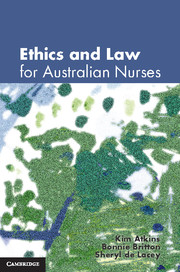Book contents
- Frontmatter
- Contents
- Introduction
- 1 Understanding the human person
- 2 Understanding legal rights and obligations
- 3 Nursing and the legal system
- 4 The nurse–patient relationship
- 5 Consent
- 6 Duty of care and professional negligence
- 7 Patient information, confidentiality and trust
- 8 ‘Trust me, I’m a nurse’
- 9 Witnessing and making mistakes
- Appendix: Tables of legislation
- References
- Index
2 - Understanding legal rights and obligations
- Frontmatter
- Contents
- Introduction
- 1 Understanding the human person
- 2 Understanding legal rights and obligations
- 3 Nursing and the legal system
- 4 The nurse–patient relationship
- 5 Consent
- 6 Duty of care and professional negligence
- 7 Patient information, confidentiality and trust
- 8 ‘Trust me, I’m a nurse’
- 9 Witnessing and making mistakes
- Appendix: Tables of legislation
- References
- Index
Summary
LEARNING OBJECTIVES
In this chapter, you will:
Gain an understanding of the social basis of rights
Develop an understanding of why laws should be morally justified
Gain an understanding of social contract theory and its limitations
Be introduced to the ‘capabilities approach’ as a moral basis for legal rights
In 1997, Ms Lorraine Smith was interviewed for a position as a director of the Red Meat Producer Corporation. At the time of her interview, she was seven months pregnant. During the interview she was asked whether she was married. When she replied that she was married, she was then asked why she had lied and left this information off her application. Ms Smith replied that it was irrelevant. One of the interviewers then stated that he had a problem employing young people with children.
After the interview, Ms Smith complained about the questions to a member of the panel who was representing the recruitment agency. The representative concurred and likened the situation to the dark ages.
Ms Smith lodged a complaint with the Human Rights and Equal Opportunity Commission (HREOC), claiming she had been treated with discrimination on the basis of her marital status because the questions were in violation of the Sex Discrimination Act 1984. HREOC found in her favour and awarded damages. (Smith v Commonwealth [2000] HREOC 3 (31 January 2000))
HREOC determined that Lorraine Smith's rights had been violated, and that the Red Meat Producer Corporation had failed to live up to its legal obligations. In handing down his determination, the commissioner took the view that the interview panel did not adequately understand the legal rights of the applicants nor, consequently, how to act in accordance with those rights.
A right is a justified entitlement to something – for example, the right to vote in democratic elections. The entitlement to that right is justified by the value Australian society places on the idea of the moral equality of citizens and self-determination. Rights also entitle us to demand that other people act (or refrain from acting) in certain ways. For example, the right to vote in democratic elections obliges other people to refrain from interfering with a person's free choice of candidates.
- Type
- Chapter
- Information
- Ethics and Law for Australian Nurses , pp. 33 - 55Publisher: Cambridge University PressPrint publication year: 2011

